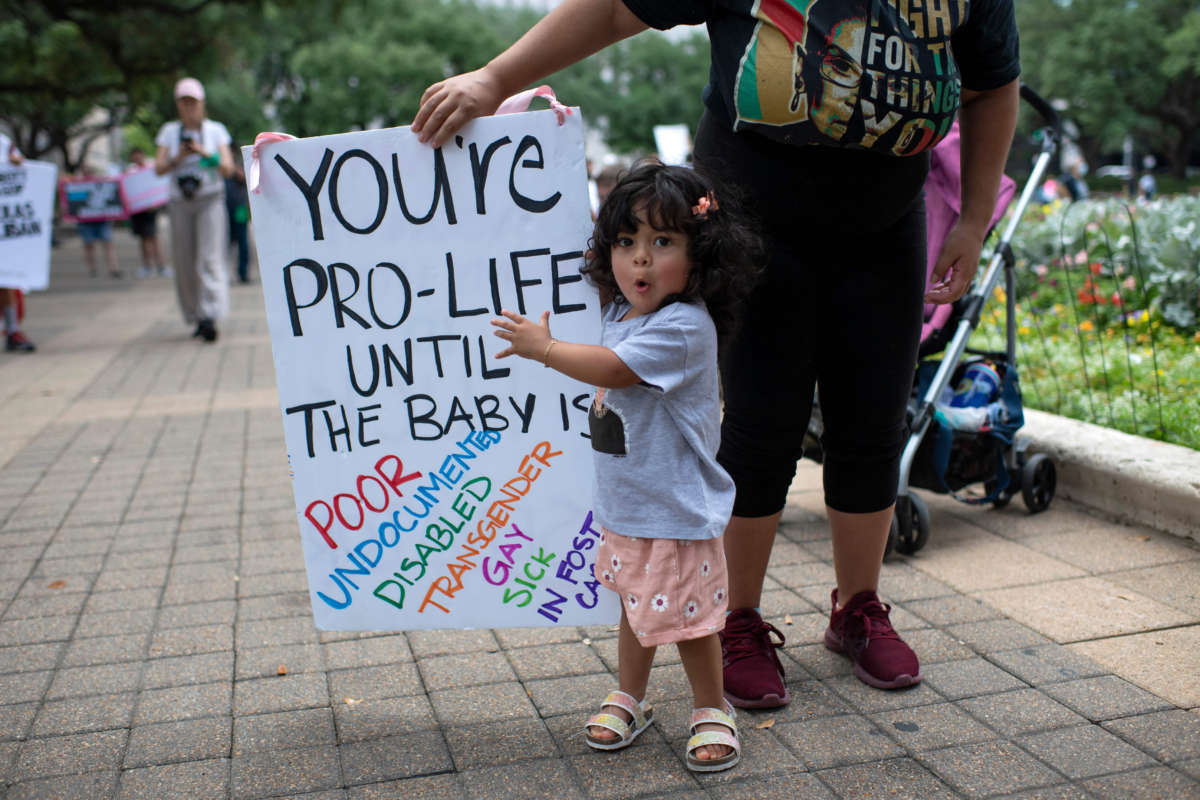Did you know that Truthout is a nonprofit and independently funded by readers like you? If you value what we do, please support our work with a donation.
A new analysis finds that states that have implemented abortion bans following far right Supreme Court justices’ overturn of Roe v. Wade also tend to have the worst levels of parental support in terms of poverty rates, rates of insured people and health outcomes.
NPR reports that the 14 states with abortion bans are among the states with the highest rates of child poverty, people living in maternal health care deserts and women who are uninsured. Nine states that are in the process of passing bans, or that have passed bans that ended up being blocked by a judge or otherwise, also have poor parental support, the data shows.
The report only included women in its health insurance analysis, though trans men and nonbinary people are also affected by abortion bans, often disproportionately so. However, the analysis gives weight to arguments that abortion bans are horrific and inhumane, and serve partially as a right-wing tool to further punish non-white and poor people.
Of the 12 states that opted not to expand Medicaid after the Affordable Care Act allowed low-income adults to access the program, eight have banned abortion, while lawmakers in at least two others are attempting to pass a ban.
Opting not to expand Medicaid doesn’t just stop many people with low incomes from being able to access health care — it also bars them from accessing funds for childbirth. Childbirth is incredibly expensive and comes with costs amounting to a down payment on a house in many states. Although Medicaid pays for about 42 percent of all births in the U.S., states could prevent more people from having to take on debt or spend significant chunks of their incomes on childbirth if they opted to expand the program.
Limited access to parental care compounds upon affordability issues. In states like Georgia, Mississippi, South Carolina, and Wisconsin — all of which have declined to expand Medicaid — there are large proportions of people who live in maternal care deserts, with around 20 percent or more of the population living in counties with limited or no access to such health services, according to NPR. Overall, eight of the 10 states with the highest proportion of their populations living in maternal care deserts have implemented abortion bans.
As a result of such problems — and decisions by lawmakers in many states with bans to give less financial assistance to parents — there are higher rates of child poverty in states with abortion bans. Seven of the 10 states with the worst child poverty rates, as ranked using Census Bureau data, have abortion bans. Experts say that abortion access has a direct link to a reduction in child poverty rates, contradicting what some GOP lawmakers have implied.
States with abortion bans also have worse health outcomes for babies and their parents. Of the six states with the worst rates of low birth weight, which can be an indicator for other health issues, five have abortion bans, while the sixth has had its abortion ban temporarily suspended by a judge.
Research has found that the U.S. is expected to experience a spike in parental death due to newly implemented abortion bans. University of Colorado researchers found earlier this year that states with already high maternal mortality and abortion rates would see an increase in maternal death of nearly 30 percent.
Overall, if a nationwide abortion ban were implemented — legislation that Republicans are threatening to pass if they take control of Congress — maternal deaths would increase by 24 percent. Black parents are especially at risk, as Black maternal deaths could undergo an increase of up to 39 percent.
NPR’s findings echo those of previous analyses. Last month, The New York Times similarly reported that families in states that have banned or are likely to ban abortion have worse financial and health incomes, while policies implemented in these states are more hostile to low-income parents.
Within states where abortion is banned or likely to be banned, about 18.5 percent of children were in poverty on average, versus 14.8 percent in states that are unlikely to ban abortion. Maternal deaths are also higher in states that have banned or are likely to ban abortion, at 25.2 deaths per 100,000 live births versus 15.0 deaths in non-ban states.
Matching Opportunity Extended: Please support Truthout today!
Our end-of-year fundraiser is over, but our donation matching opportunity has been extended! All donations to Truthout will be matched dollar for dollar for a limited time.
Your one-time gift today will be matched immediately. Your monthly donation will be matched for the whole first year, doubling your impact.
This matching gift comes at a critical time. As Trump attempts to silence dissenting voices and oppositional nonprofits, reader support is our best defense against the right-wing agenda.
Help Truthout confront Trump’s fascism in 2026, and have your donation matched now!
